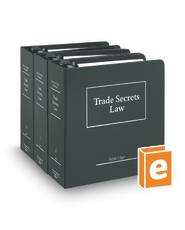
A trade secret, as defined by the Uniform Trade Secrets Act, is business information that is kept confidential to maintain an advantage over competitors, such as a formula, pattern, compilation, program, device, method, technique, or process, which (1) derives independent economic value, actual or potential, from not being generally known to, and not being readily ascertainable by proper means by, other persons who can obtain economic value from its disclosure or use, and (2) is the subject of efforts that are reasonable under the circumstances to maintain its secrecy.
The Defend Trade Secrets Act of 2016 is a federal law that provides a civil cause of action for misappropriation of trade secrets. Use the links below to research this landmark intellectual property legislation. For more information on its legislative history, see our guide, A Legislative History of the Defend Trade Secrets Act of 2016.
One good way to find cases about trade secrets is to start from a section of the federal Defend Trade Secrets Act or a state trade secrets statute in Westlaw or Lexis and use the database's annotation and citation features. Notes of Decisions in Westlaw (or Case Notes in Lexis) provide summaries from prominent cases. You can also use the Citing References tab in Westlaw (or Shepherd's in Lexis) to find additional cases that cite that section. Use the links below to explore more finding aids:
 Milgrim on Trade Secrets
by
Milgrim on Trade Secrets
by
 Trade Secrets Law
by
Trade Secrets Law
by